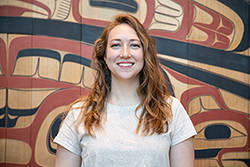Visiting scholar to study how subsistence diet affects mouth bacteria
Sealaska Heritage Institute, a Juneau-based nonprofit that protects and promotes Alaska Native arts and cultures, is sponsoring a visiting scholar who is studying how subsistence diets affect oral health.
The scholar is Alyssa Bader, a Tsmishian anthropologist with expertise in ancient DNA, bioarchaeology and stable isotope analysis, who will research this fall and facilitate focus groups to identify the social, economic, environmental and political factors that shap subsistence in Southeast Alaska.
Bader will collect mouth swabs to examine how the oral microbiome responds to dietary variation, especially variation in the amount and type of traditional foods consumed.
The traditional foods consumed by Native people in the region are some of the healthiest in the world, said SHI President Rosita Worl, in a press release. Some communities maintain a diet made up largely of traditional foods, while others rely partly or largely on Western food, Worl said, noting the integration of Western foods has occurred in a relatively short period of time.
Bader will be reaching out to leadership in communities throughout Southeast Alaska this winter. People with questions or who want to participate may contact her at acbader2@illinois.edu.
Individual data collected will be kept confidential and used only for the study, and the samples will later be destroyed.
In addition, Bader will regularly update communities on the progress of the project and present preliminary results for community feedback and collaborative interpretation of the results.
Each collaborating community, and Sealaska Heritage Institute’s archives, will receive a copy of all publications from the project.
SHI will also sponsor a lecture by Bader on her research.
University of Alaska Southeast launched the Kayak Oceanography Program
From July 5-19, faculty and students paddled over 120 miles in Holkham Bay and Endicott Arm in a new Kayak Oceanography Program at University of Alaska Southeast.
The program was led by university professors Michael Navarro and Glenn Wright, kayak instructor and naturalist Hallie Heath, and University of Washington researcher Mattias Cape. The inaugural year of the program provided UAS undergraduates oceanographic training to understand interactions between glaciers and the coastal ocean, integrating themes in sustainability, physics, chemistry, biology and science communication. The Alaska Space Grant Program provided supplemental funding during the initial year.
“We designed this program, featuring collaboration between UAS Natural Sciences and Outdoor Studies, so students can learn fundamental oceanographic principles through a 15-day expedition paddling experience, camping and data-gathering in beautiful Southeast Alaska,” Navarro said in a press release. “Our course in Kayak Oceanography demonstrates UAS’ commitment to interdisciplinary teaching and research, integrating biology, oceanography, expedition planning, paddling skills, and the social sciences,” Wright added.
New Juneau Arts & Culture Center effort receives original ‘The Wizard of Oz’ donation
The Partnership, Inc., the nonprofit that raises funds to build the New Juneau Arts & Culture Center, received an original hardcover edition of “The Wonderful Wizard of Oz” by L. Frank Baum. First editions of the book were printed in 1900. This donation comes from the daughter of longtime patron, advocate and arts supporter, Kathy Kolkhorst Ruddy.
Oz
Ruddy gave this precious book to her daughter Anna Ruddy Speichinger on her 18th birthday, and Speichinger gave it to The Partnership to help make the New JACC a reality and to honor her mother’s many contributions to the quality of life in Juneau.
Ruddy moved to Juneau in 1977 and was married to the late Bill Ruddy. Both practiced law in Juneau for many years, and Ruddy was also a civic leader who held many important positions, serving as President of the Juneau Chamber of Commerce, co-founding Juneau Jazz & Classics, and chairing many arts organizations’ boards of directors.
“I think it’s safe to say that we’re not in Kansas anymore,” said Nancy DeCherney, Executive Director of the Juneau Arts & Humanities Council, in a release. “This tremendous gift will be carefully assessed as we decide how best to use it to provide the greatest level of support for the New JACC at this critical time. Kathy’s love for the arts and Juneau is shining on us all right now like the glow from the Emerald City.”

